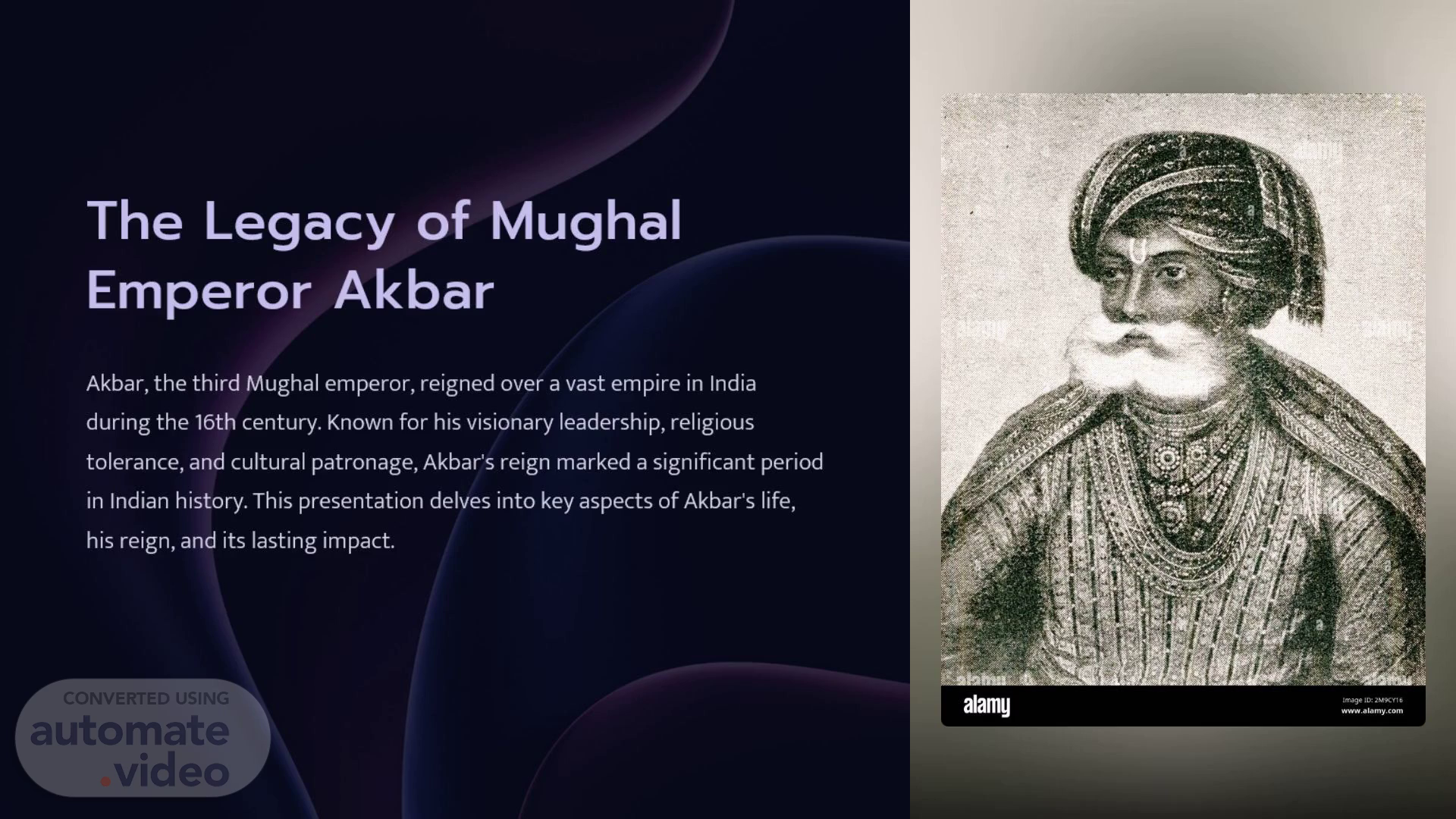Scene 1 (0s)
[Audio] The Legacy of Mughal Emperor Akbar Akbar, the third emperor of the Mughal dynasty, ruled over a vast empire in India during the 16th century. Recognized for his visionary leadership, religious acceptance, and support of the arts, Akbar's reign was a crucial era in Indian history. This presentation explores important components of Akbar's life, his rule, and its enduring influence..
Scene 2 (28s)
[Audio] Birth and Early Life Birth Akbar was born in 1542 in Umerkot, Sindh, to Humayun, the second Mughal emperor. His mother was Hamida Banu Begum, a Persian noblewoman. Early Years Akbar's formative years were marked by turbulence as a result of Humayun's exile and the political unrest in India. His education was managed by his maternal uncle, Bairam Khan. Ascension to the Throne At the young age of 13, Akbar took over the throne of the Mughal empire following Humayun's passing in 1556. He inherited a vast empire, but one that was also facing instability..
Scene 3 (1m 12s)
[Audio] Ascending to the Throne: Strengthening the Mughal Dynasty Initial Triumphs The Battle of Panipat (1556) Growth and Strengthening In the beginning of his reign, Akbar's military efforts were aimed at solidifying his rule over the empire, conquering rebellious Afghan leaders, and securing important territories in Northern India. A significant battle against Hemu, a powerful Afghan commander, cemented Akbar's right to the throne and established Mughal dominance. In the following decades, Akbar expanded his empire through strategic alliances, military campaigns, and administrative reforms, effectively gaining control over a vast region..
Scene 4 (1m 59s)
[Audio] Akbar's Religious Reforms and Policies Religious Tolerance The Divine Faith Akbar believed in the unity of all religions and actively promoted religious harmony and tolerance. He sought to create a syncretic religion, known as Din-i-Ilahi, that would encompass elements of Hinduism, Islam, Christianity, and Zoroastrianism. Abolishment of Jizya Dialogue with Scholars In his efforts to promote religious equality, Akbar abolished the jizya tax, which was previously imposed on non-Muslims. He also engaged in dialogues with scholars from different religions, fostering an environment of intellectual exchange and mutual understanding..
Scene 5 (2m 47s)
[Audio] Akbar's Military Conquests and Expansions Gujarat (1572-1573) Akbar's campaign against the Sultanate of Gujarat resulted in the region being taken over, which enriched the Mughal treasury and expanded its territory. Rajasthan (1562-1570) Akbar's successful conquest of Rajasthan brought important territories under Mughal control, strengthening the empire's influence in the western region. Malwa (1561-1562) The annexation of Malwa added a wealthy and fertile area to the Mughal Empire, further solidifying its dominance over central India. Khandesh (1599) By conquering Khandesh, the Mughal Empire gained control over a strategically significant territory, expanding its influence in the Deccan region..
Scene 6 (3m 45s)
[Audio] Akbar was known for his significant contributions to art, architecture, and culture. He is credited with building impressive structures such as Fatehpur Sikri and Agra Fort. These structures served as a symbol of his power and also showcased his keen eye for design. Fatehpur Sikri, which was built as Akbar's capital city, boasts breathtaking architecture including the Buland Darwaza and the Jama Masjid. Similarly, the Agra Fort, situated in Agra, is a grand display of different architectural styles, reflecting Akbar's diverse and unique taste..
Scene 7 (4m 25s)
[Audio] Akbar's rule and influence on India Religious tolerance Akbar's actions created an environment of unity among different religions. Reforms in administration His effective administrative structure set a strong base for later Mughal emperors. Support for culture He supported the development of art, architecture, and literature, shaping Indian culture. Expansion of the empire His victories solidified Mughal authority and enlarged the empire's territory..
Scene 8 (4m 57s)
[Audio] Conclusion: The lasting impact of Akbar's reign Religious Tolerance Akbar's commitment to religious tolerance continues to serve as a source of inspiration. Administrative Reforms His effective system of governance influenced the future rule of the Mughal empire. Cultural Patronage Akbar's support for the arts and architecture had a significant and enduring influence on Indian culture. Expansion of Empire Through his conquests, Akbar strengthened the Mughal empire and solidified its power..
